Nursing Case Study: Legal, Ethical, and Professional Boundaries
VerifiedAdded on 2021/06/14
|11
|2699
|243
Case Study
AI Summary
This case study examines a scenario involving a newly graduated nurse, Sharni, who breaches patient confidentiality and professional boundaries. The case revolves around Sharni accessing a patient's medical records without authorization and posting a condolence message on social media, leading to legal, ethical, and professional ramifications. The paper delves into the legal issues, citing the Code of Professional Conduct for Nurses in Australia and relevant privacy acts, emphasizing the importance of patient privacy and informed consent. Ethical issues are explored through the lens of the ICN Code of Ethics, bioethics principles (autonomy, beneficence, non-maleficence, and justice), and the impact of social media on nursing practice. Professional issues are examined in relation to the NMBA code of conduct and social media policy, highlighting the significance of professionalism, trust, and adherence to professional obligations. The conclusion underscores the importance of adhering to legal, ethical, and professional principles in nursing practice to ensure patient safety and maintain professional integrity.
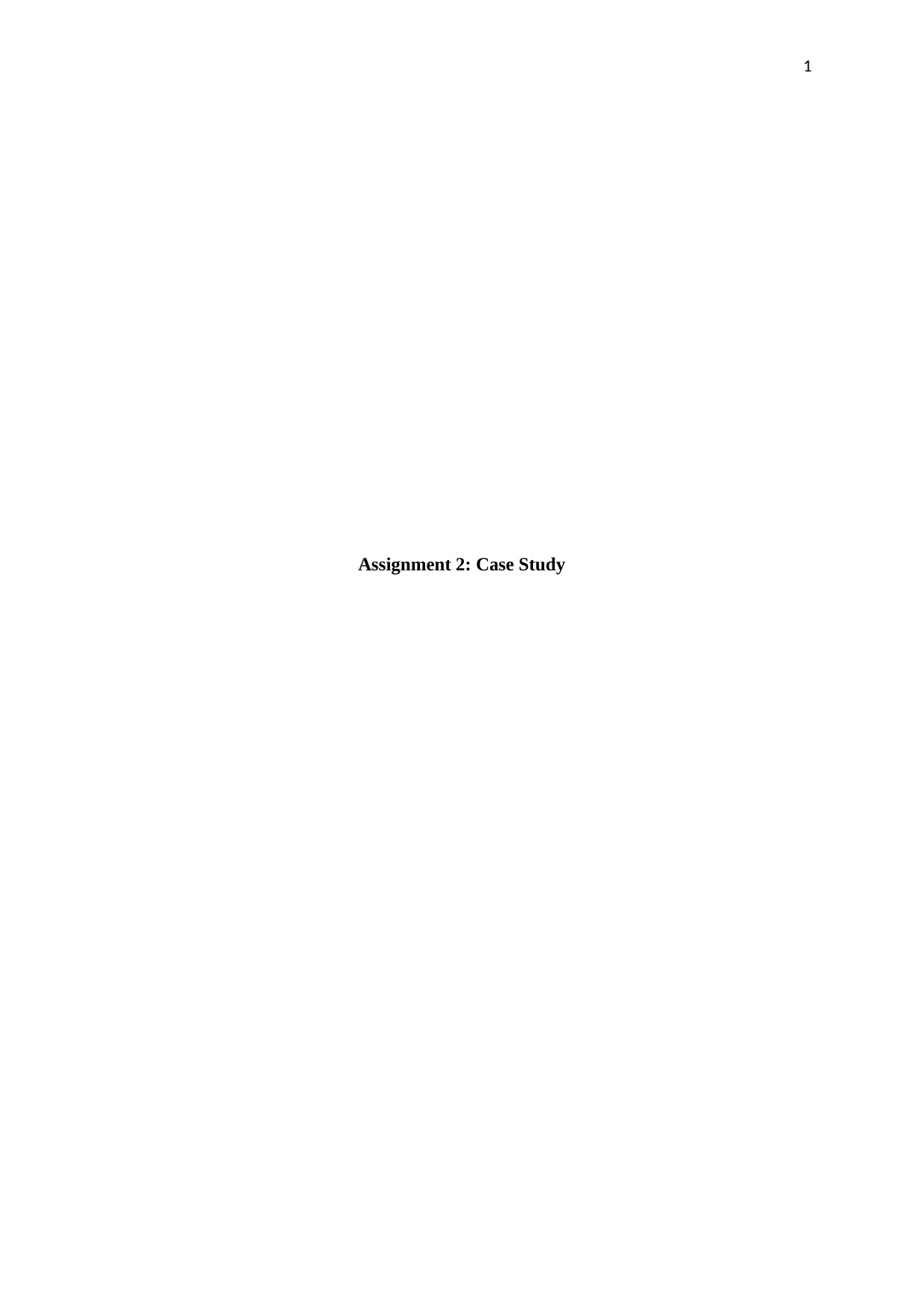
1
Assignment 2: Case Study
Assignment 2: Case Study
Paraphrase This Document
Need a fresh take? Get an instant paraphrase of this document with our AI Paraphraser
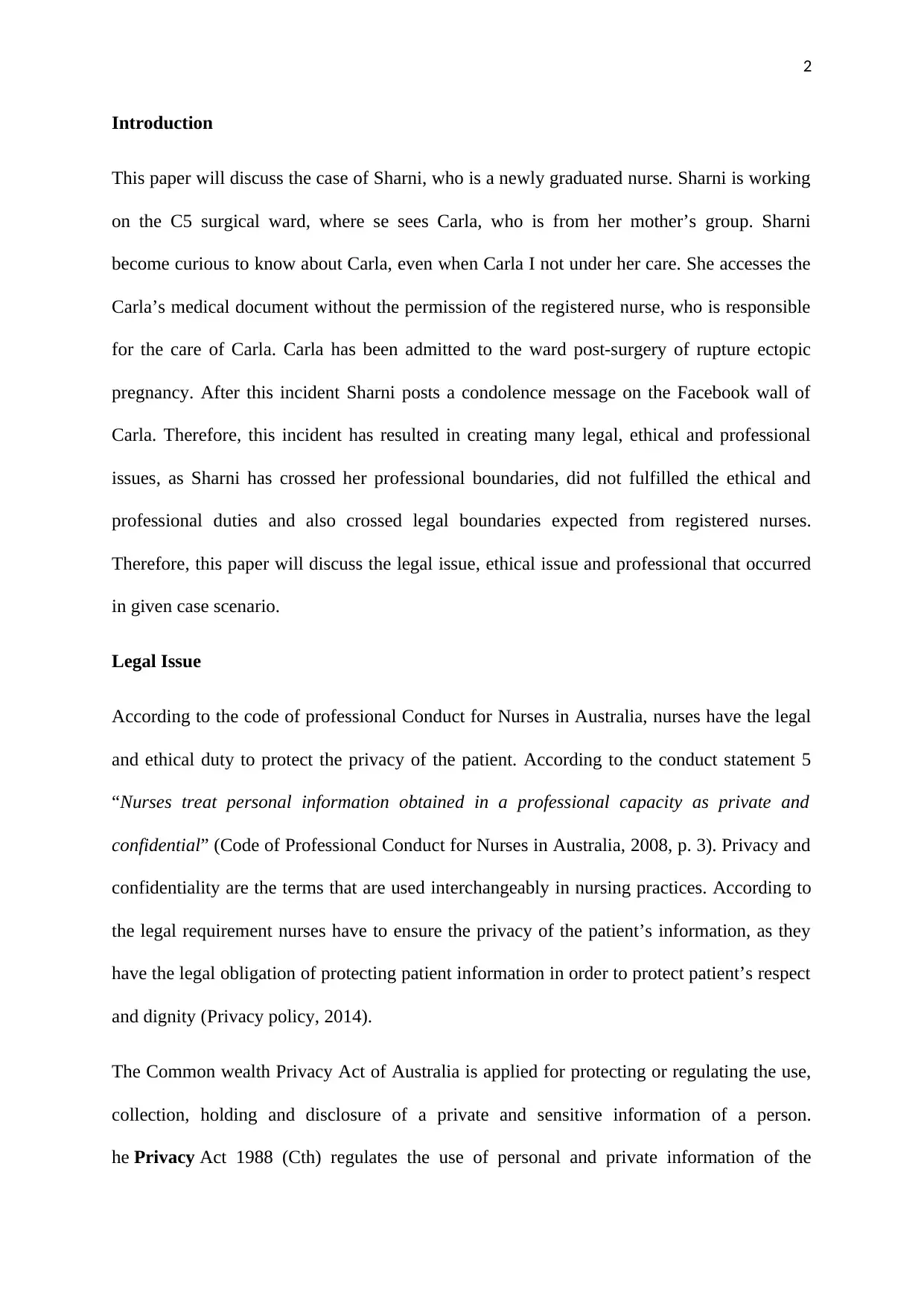
2
Introduction
This paper will discuss the case of Sharni, who is a newly graduated nurse. Sharni is working
on the C5 surgical ward, where se sees Carla, who is from her mother’s group. Sharni
become curious to know about Carla, even when Carla I not under her care. She accesses the
Carla’s medical document without the permission of the registered nurse, who is responsible
for the care of Carla. Carla has been admitted to the ward post-surgery of rupture ectopic
pregnancy. After this incident Sharni posts a condolence message on the Facebook wall of
Carla. Therefore, this incident has resulted in creating many legal, ethical and professional
issues, as Sharni has crossed her professional boundaries, did not fulfilled the ethical and
professional duties and also crossed legal boundaries expected from registered nurses.
Therefore, this paper will discuss the legal issue, ethical issue and professional that occurred
in given case scenario.
Legal Issue
According to the code of professional Conduct for Nurses in Australia, nurses have the legal
and ethical duty to protect the privacy of the patient. According to the conduct statement 5
“Nurses treat personal information obtained in a professional capacity as private and
confidential” (Code of Professional Conduct for Nurses in Australia, 2008, p. 3). Privacy and
confidentiality are the terms that are used interchangeably in nursing practices. According to
the legal requirement nurses have to ensure the privacy of the patient’s information, as they
have the legal obligation of protecting patient information in order to protect patient’s respect
and dignity (Privacy policy, 2014).
The Common wealth Privacy Act of Australia is applied for protecting or regulating the use,
collection, holding and disclosure of a private and sensitive information of a person.
he Privacy Act 1988 (Cth) regulates the use of personal and private information of the
Introduction
This paper will discuss the case of Sharni, who is a newly graduated nurse. Sharni is working
on the C5 surgical ward, where se sees Carla, who is from her mother’s group. Sharni
become curious to know about Carla, even when Carla I not under her care. She accesses the
Carla’s medical document without the permission of the registered nurse, who is responsible
for the care of Carla. Carla has been admitted to the ward post-surgery of rupture ectopic
pregnancy. After this incident Sharni posts a condolence message on the Facebook wall of
Carla. Therefore, this incident has resulted in creating many legal, ethical and professional
issues, as Sharni has crossed her professional boundaries, did not fulfilled the ethical and
professional duties and also crossed legal boundaries expected from registered nurses.
Therefore, this paper will discuss the legal issue, ethical issue and professional that occurred
in given case scenario.
Legal Issue
According to the code of professional Conduct for Nurses in Australia, nurses have the legal
and ethical duty to protect the privacy of the patient. According to the conduct statement 5
“Nurses treat personal information obtained in a professional capacity as private and
confidential” (Code of Professional Conduct for Nurses in Australia, 2008, p. 3). Privacy and
confidentiality are the terms that are used interchangeably in nursing practices. According to
the legal requirement nurses have to ensure the privacy of the patient’s information, as they
have the legal obligation of protecting patient information in order to protect patient’s respect
and dignity (Privacy policy, 2014).
The Common wealth Privacy Act of Australia is applied for protecting or regulating the use,
collection, holding and disclosure of a private and sensitive information of a person.
he Privacy Act 1988 (Cth) regulates the use of personal and private information of the
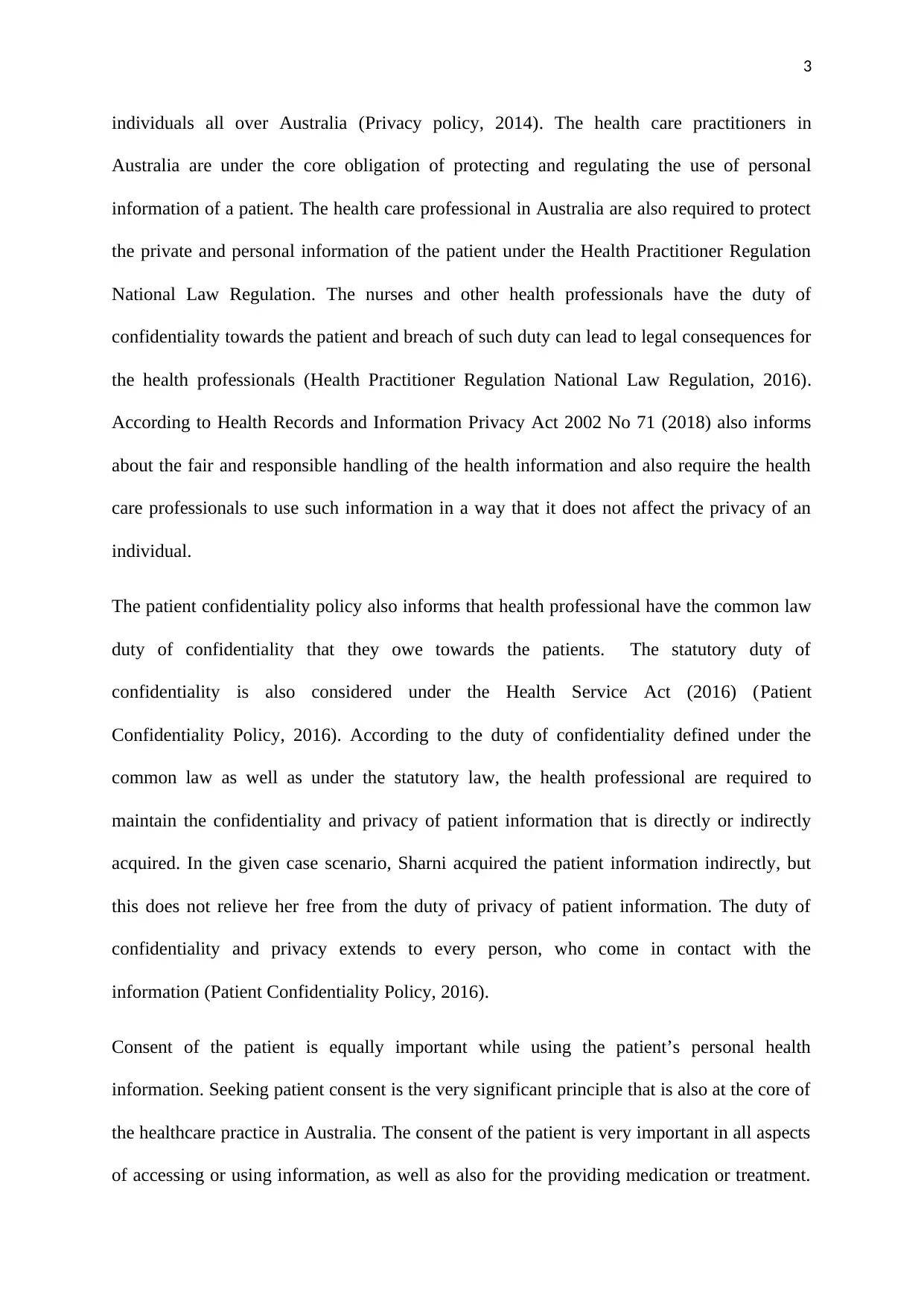
3
individuals all over Australia (Privacy policy, 2014). The health care practitioners in
Australia are under the core obligation of protecting and regulating the use of personal
information of a patient. The health care professional in Australia are also required to protect
the private and personal information of the patient under the Health Practitioner Regulation
National Law Regulation. The nurses and other health professionals have the duty of
confidentiality towards the patient and breach of such duty can lead to legal consequences for
the health professionals (Health Practitioner Regulation National Law Regulation, 2016).
According to Health Records and Information Privacy Act 2002 No 71 (2018) also informs
about the fair and responsible handling of the health information and also require the health
care professionals to use such information in a way that it does not affect the privacy of an
individual.
The patient confidentiality policy also informs that health professional have the common law
duty of confidentiality that they owe towards the patients. The statutory duty of
confidentiality is also considered under the Health Service Act (2016) (Patient
Confidentiality Policy, 2016). According to the duty of confidentiality defined under the
common law as well as under the statutory law, the health professional are required to
maintain the confidentiality and privacy of patient information that is directly or indirectly
acquired. In the given case scenario, Sharni acquired the patient information indirectly, but
this does not relieve her free from the duty of privacy of patient information. The duty of
confidentiality and privacy extends to every person, who come in contact with the
information (Patient Confidentiality Policy, 2016).
Consent of the patient is equally important while using the patient’s personal health
information. Seeking patient consent is the very significant principle that is also at the core of
the healthcare practice in Australia. The consent of the patient is very important in all aspects
of accessing or using information, as well as also for the providing medication or treatment.
individuals all over Australia (Privacy policy, 2014). The health care practitioners in
Australia are under the core obligation of protecting and regulating the use of personal
information of a patient. The health care professional in Australia are also required to protect
the private and personal information of the patient under the Health Practitioner Regulation
National Law Regulation. The nurses and other health professionals have the duty of
confidentiality towards the patient and breach of such duty can lead to legal consequences for
the health professionals (Health Practitioner Regulation National Law Regulation, 2016).
According to Health Records and Information Privacy Act 2002 No 71 (2018) also informs
about the fair and responsible handling of the health information and also require the health
care professionals to use such information in a way that it does not affect the privacy of an
individual.
The patient confidentiality policy also informs that health professional have the common law
duty of confidentiality that they owe towards the patients. The statutory duty of
confidentiality is also considered under the Health Service Act (2016) (Patient
Confidentiality Policy, 2016). According to the duty of confidentiality defined under the
common law as well as under the statutory law, the health professional are required to
maintain the confidentiality and privacy of patient information that is directly or indirectly
acquired. In the given case scenario, Sharni acquired the patient information indirectly, but
this does not relieve her free from the duty of privacy of patient information. The duty of
confidentiality and privacy extends to every person, who come in contact with the
information (Patient Confidentiality Policy, 2016).
Consent of the patient is equally important while using the patient’s personal health
information. Seeking patient consent is the very significant principle that is also at the core of
the healthcare practice in Australia. The consent of the patient is very important in all aspects
of accessing or using information, as well as also for the providing medication or treatment.
⊘ This is a preview!⊘
Do you want full access?
Subscribe today to unlock all pages.

Trusted by 1+ million students worldwide
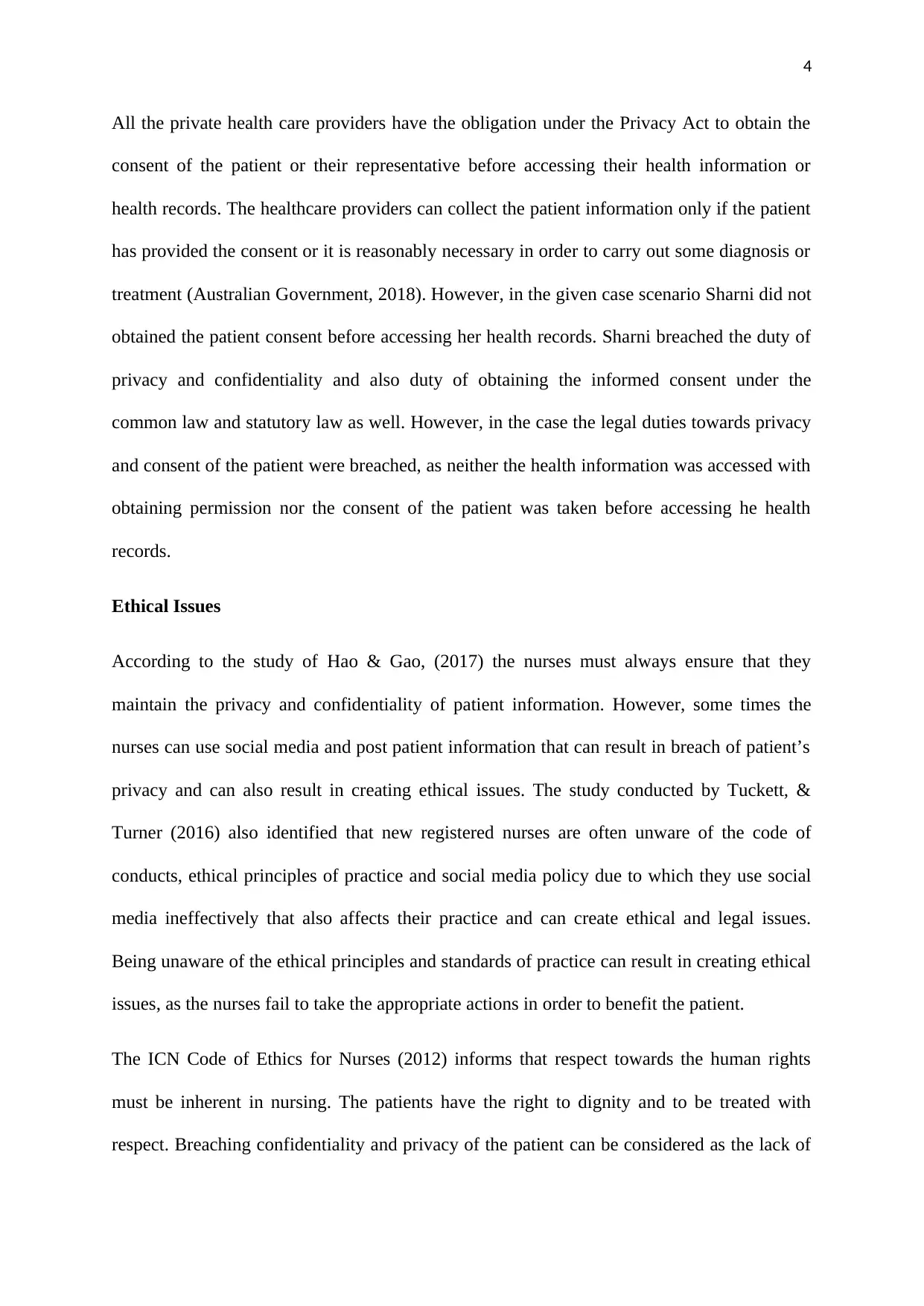
4
All the private health care providers have the obligation under the Privacy Act to obtain the
consent of the patient or their representative before accessing their health information or
health records. The healthcare providers can collect the patient information only if the patient
has provided the consent or it is reasonably necessary in order to carry out some diagnosis or
treatment (Australian Government, 2018). However, in the given case scenario Sharni did not
obtained the patient consent before accessing her health records. Sharni breached the duty of
privacy and confidentiality and also duty of obtaining the informed consent under the
common law and statutory law as well. However, in the case the legal duties towards privacy
and consent of the patient were breached, as neither the health information was accessed with
obtaining permission nor the consent of the patient was taken before accessing he health
records.
Ethical Issues
According to the study of Hao & Gao, (2017) the nurses must always ensure that they
maintain the privacy and confidentiality of patient information. However, some times the
nurses can use social media and post patient information that can result in breach of patient’s
privacy and can also result in creating ethical issues. The study conducted by Tuckett, &
Turner (2016) also identified that new registered nurses are often unware of the code of
conducts, ethical principles of practice and social media policy due to which they use social
media ineffectively that also affects their practice and can create ethical and legal issues.
Being unaware of the ethical principles and standards of practice can result in creating ethical
issues, as the nurses fail to take the appropriate actions in order to benefit the patient.
The ICN Code of Ethics for Nurses (2012) informs that respect towards the human rights
must be inherent in nursing. The patients have the right to dignity and to be treated with
respect. Breaching confidentiality and privacy of the patient can be considered as the lack of
All the private health care providers have the obligation under the Privacy Act to obtain the
consent of the patient or their representative before accessing their health information or
health records. The healthcare providers can collect the patient information only if the patient
has provided the consent or it is reasonably necessary in order to carry out some diagnosis or
treatment (Australian Government, 2018). However, in the given case scenario Sharni did not
obtained the patient consent before accessing her health records. Sharni breached the duty of
privacy and confidentiality and also duty of obtaining the informed consent under the
common law and statutory law as well. However, in the case the legal duties towards privacy
and consent of the patient were breached, as neither the health information was accessed with
obtaining permission nor the consent of the patient was taken before accessing he health
records.
Ethical Issues
According to the study of Hao & Gao, (2017) the nurses must always ensure that they
maintain the privacy and confidentiality of patient information. However, some times the
nurses can use social media and post patient information that can result in breach of patient’s
privacy and can also result in creating ethical issues. The study conducted by Tuckett, &
Turner (2016) also identified that new registered nurses are often unware of the code of
conducts, ethical principles of practice and social media policy due to which they use social
media ineffectively that also affects their practice and can create ethical and legal issues.
Being unaware of the ethical principles and standards of practice can result in creating ethical
issues, as the nurses fail to take the appropriate actions in order to benefit the patient.
The ICN Code of Ethics for Nurses (2012) informs that respect towards the human rights
must be inherent in nursing. The patients have the right to dignity and to be treated with
respect. Breaching confidentiality and privacy of the patient can be considered as the lack of
Paraphrase This Document
Need a fresh take? Get an instant paraphrase of this document with our AI Paraphraser
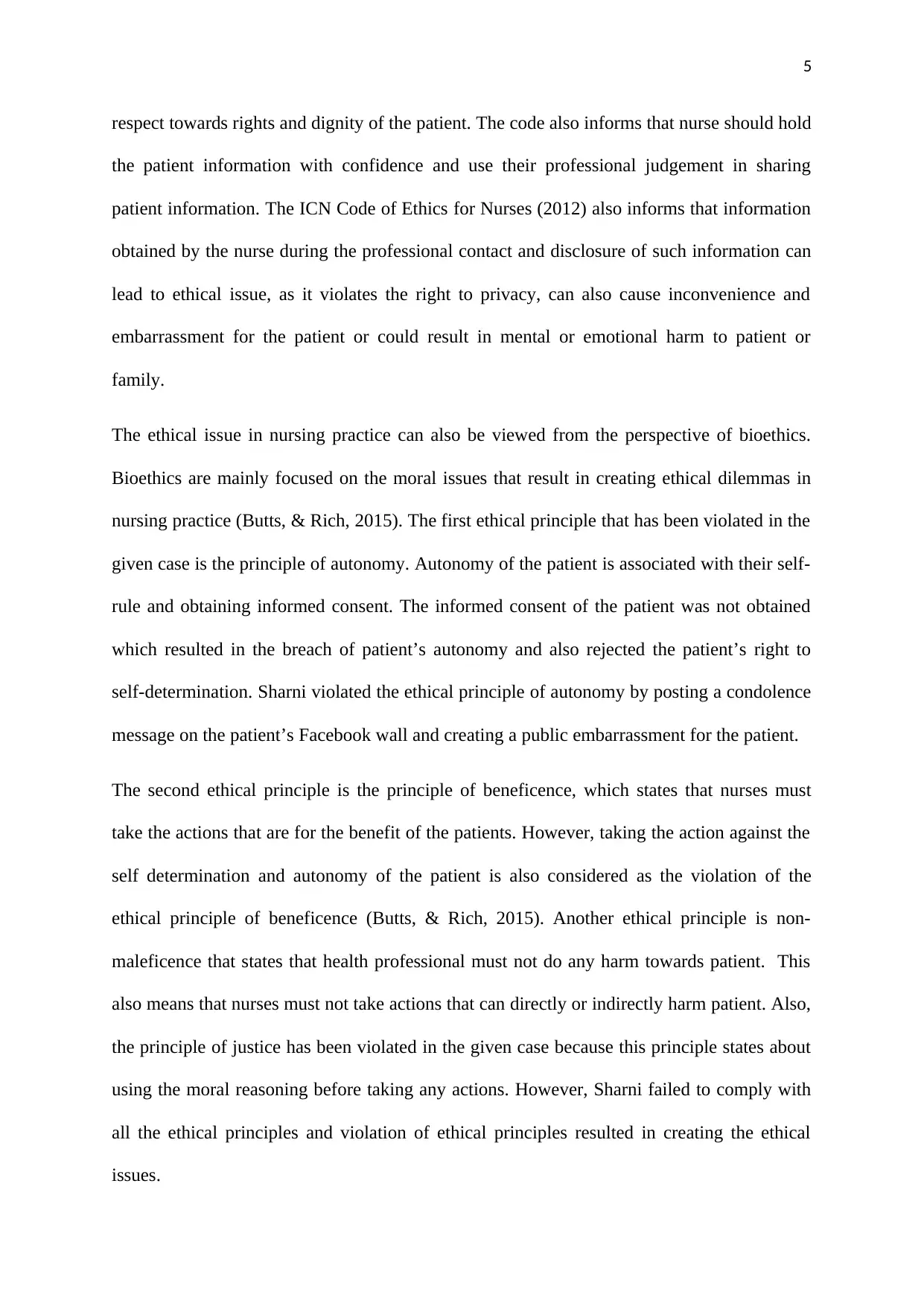
5
respect towards rights and dignity of the patient. The code also informs that nurse should hold
the patient information with confidence and use their professional judgement in sharing
patient information. The ICN Code of Ethics for Nurses (2012) also informs that information
obtained by the nurse during the professional contact and disclosure of such information can
lead to ethical issue, as it violates the right to privacy, can also cause inconvenience and
embarrassment for the patient or could result in mental or emotional harm to patient or
family.
The ethical issue in nursing practice can also be viewed from the perspective of bioethics.
Bioethics are mainly focused on the moral issues that result in creating ethical dilemmas in
nursing practice (Butts, & Rich, 2015). The first ethical principle that has been violated in the
given case is the principle of autonomy. Autonomy of the patient is associated with their self-
rule and obtaining informed consent. The informed consent of the patient was not obtained
which resulted in the breach of patient’s autonomy and also rejected the patient’s right to
self-determination. Sharni violated the ethical principle of autonomy by posting a condolence
message on the patient’s Facebook wall and creating a public embarrassment for the patient.
The second ethical principle is the principle of beneficence, which states that nurses must
take the actions that are for the benefit of the patients. However, taking the action against the
self determination and autonomy of the patient is also considered as the violation of the
ethical principle of beneficence (Butts, & Rich, 2015). Another ethical principle is non-
maleficence that states that health professional must not do any harm towards patient. This
also means that nurses must not take actions that can directly or indirectly harm patient. Also,
the principle of justice has been violated in the given case because this principle states about
using the moral reasoning before taking any actions. However, Sharni failed to comply with
all the ethical principles and violation of ethical principles resulted in creating the ethical
issues.
respect towards rights and dignity of the patient. The code also informs that nurse should hold
the patient information with confidence and use their professional judgement in sharing
patient information. The ICN Code of Ethics for Nurses (2012) also informs that information
obtained by the nurse during the professional contact and disclosure of such information can
lead to ethical issue, as it violates the right to privacy, can also cause inconvenience and
embarrassment for the patient or could result in mental or emotional harm to patient or
family.
The ethical issue in nursing practice can also be viewed from the perspective of bioethics.
Bioethics are mainly focused on the moral issues that result in creating ethical dilemmas in
nursing practice (Butts, & Rich, 2015). The first ethical principle that has been violated in the
given case is the principle of autonomy. Autonomy of the patient is associated with their self-
rule and obtaining informed consent. The informed consent of the patient was not obtained
which resulted in the breach of patient’s autonomy and also rejected the patient’s right to
self-determination. Sharni violated the ethical principle of autonomy by posting a condolence
message on the patient’s Facebook wall and creating a public embarrassment for the patient.
The second ethical principle is the principle of beneficence, which states that nurses must
take the actions that are for the benefit of the patients. However, taking the action against the
self determination and autonomy of the patient is also considered as the violation of the
ethical principle of beneficence (Butts, & Rich, 2015). Another ethical principle is non-
maleficence that states that health professional must not do any harm towards patient. This
also means that nurses must not take actions that can directly or indirectly harm patient. Also,
the principle of justice has been violated in the given case because this principle states about
using the moral reasoning before taking any actions. However, Sharni failed to comply with
all the ethical principles and violation of ethical principles resulted in creating the ethical
issues.
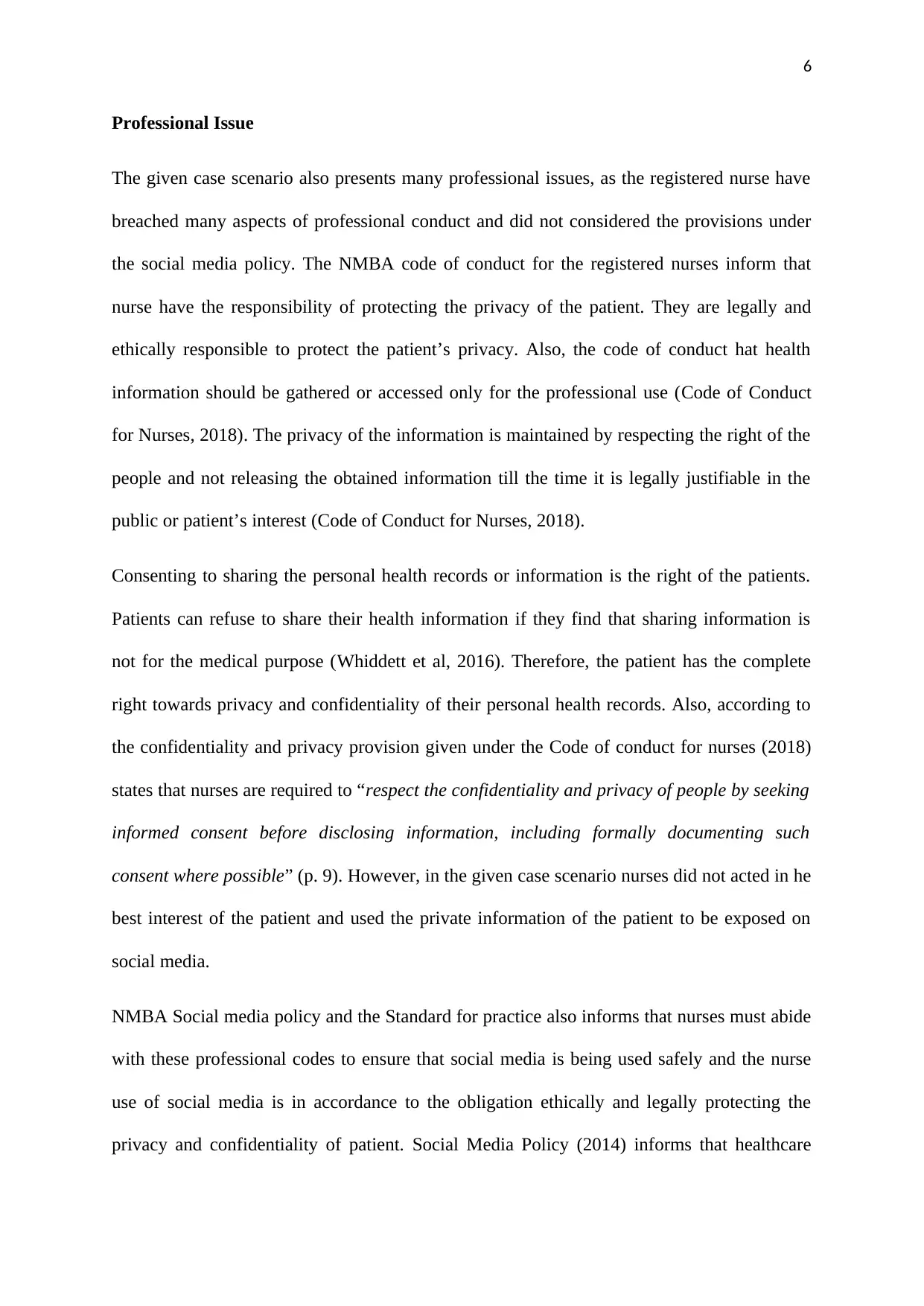
6
Professional Issue
The given case scenario also presents many professional issues, as the registered nurse have
breached many aspects of professional conduct and did not considered the provisions under
the social media policy. The NMBA code of conduct for the registered nurses inform that
nurse have the responsibility of protecting the privacy of the patient. They are legally and
ethically responsible to protect the patient’s privacy. Also, the code of conduct hat health
information should be gathered or accessed only for the professional use (Code of Conduct
for Nurses, 2018). The privacy of the information is maintained by respecting the right of the
people and not releasing the obtained information till the time it is legally justifiable in the
public or patient’s interest (Code of Conduct for Nurses, 2018).
Consenting to sharing the personal health records or information is the right of the patients.
Patients can refuse to share their health information if they find that sharing information is
not for the medical purpose (Whiddett et al, 2016). Therefore, the patient has the complete
right towards privacy and confidentiality of their personal health records. Also, according to
the confidentiality and privacy provision given under the Code of conduct for nurses (2018)
states that nurses are required to “respect the confidentiality and privacy of people by seeking
informed consent before disclosing information, including formally documenting such
consent where possible” (p. 9). However, in the given case scenario nurses did not acted in he
best interest of the patient and used the private information of the patient to be exposed on
social media.
NMBA Social media policy and the Standard for practice also informs that nurses must abide
with these professional codes to ensure that social media is being used safely and the nurse
use of social media is in accordance to the obligation ethically and legally protecting the
privacy and confidentiality of patient. Social Media Policy (2014) informs that healthcare
Professional Issue
The given case scenario also presents many professional issues, as the registered nurse have
breached many aspects of professional conduct and did not considered the provisions under
the social media policy. The NMBA code of conduct for the registered nurses inform that
nurse have the responsibility of protecting the privacy of the patient. They are legally and
ethically responsible to protect the patient’s privacy. Also, the code of conduct hat health
information should be gathered or accessed only for the professional use (Code of Conduct
for Nurses, 2018). The privacy of the information is maintained by respecting the right of the
people and not releasing the obtained information till the time it is legally justifiable in the
public or patient’s interest (Code of Conduct for Nurses, 2018).
Consenting to sharing the personal health records or information is the right of the patients.
Patients can refuse to share their health information if they find that sharing information is
not for the medical purpose (Whiddett et al, 2016). Therefore, the patient has the complete
right towards privacy and confidentiality of their personal health records. Also, according to
the confidentiality and privacy provision given under the Code of conduct for nurses (2018)
states that nurses are required to “respect the confidentiality and privacy of people by seeking
informed consent before disclosing information, including formally documenting such
consent where possible” (p. 9). However, in the given case scenario nurses did not acted in he
best interest of the patient and used the private information of the patient to be exposed on
social media.
NMBA Social media policy and the Standard for practice also informs that nurses must abide
with these professional codes to ensure that social media is being used safely and the nurse
use of social media is in accordance to the obligation ethically and legally protecting the
privacy and confidentiality of patient. Social Media Policy (2014) informs that healthcare
⊘ This is a preview!⊘
Do you want full access?
Subscribe today to unlock all pages.

Trusted by 1+ million students worldwide
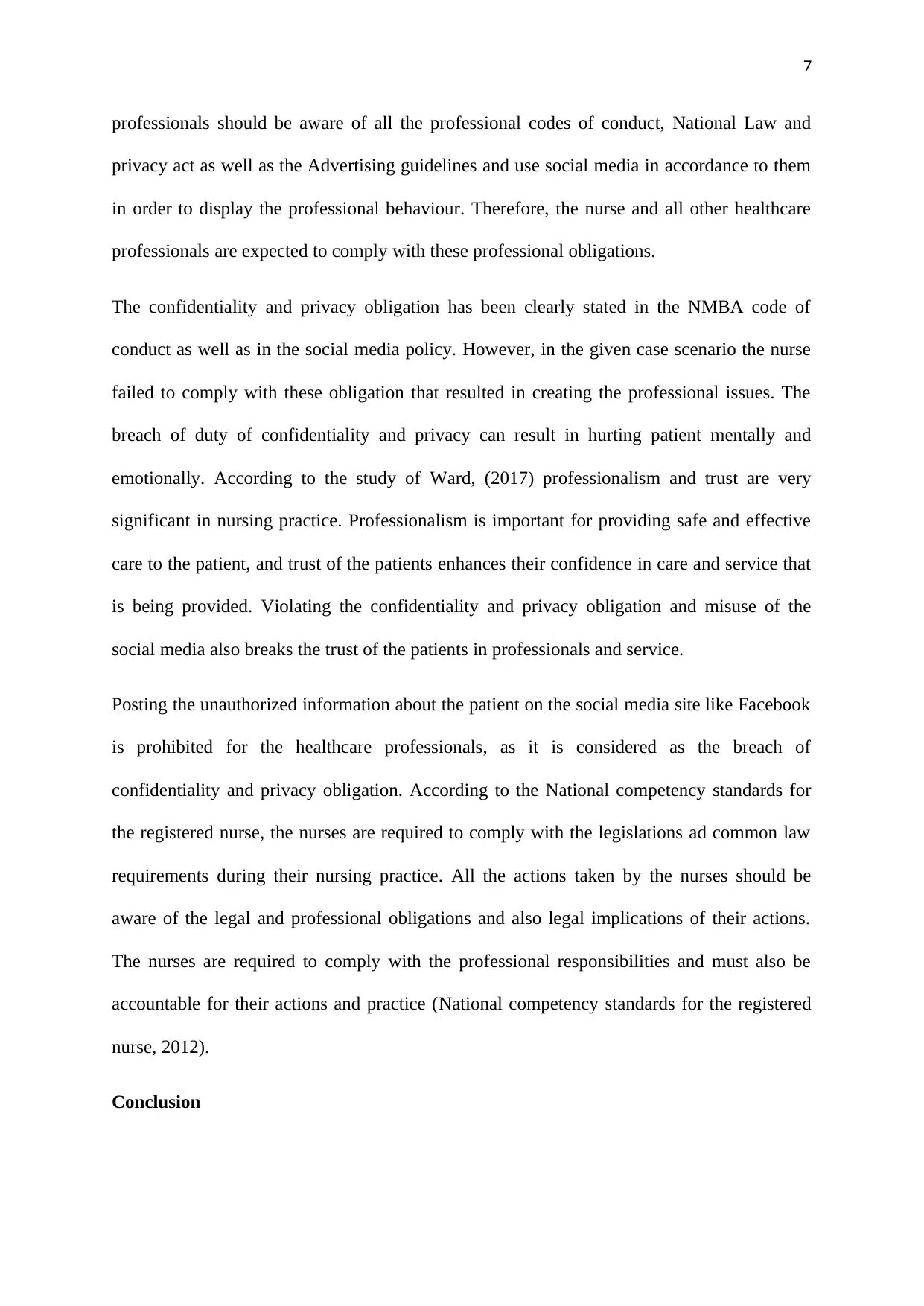
7
professionals should be aware of all the professional codes of conduct, National Law and
privacy act as well as the Advertising guidelines and use social media in accordance to them
in order to display the professional behaviour. Therefore, the nurse and all other healthcare
professionals are expected to comply with these professional obligations.
The confidentiality and privacy obligation has been clearly stated in the NMBA code of
conduct as well as in the social media policy. However, in the given case scenario the nurse
failed to comply with these obligation that resulted in creating the professional issues. The
breach of duty of confidentiality and privacy can result in hurting patient mentally and
emotionally. According to the study of Ward, (2017) professionalism and trust are very
significant in nursing practice. Professionalism is important for providing safe and effective
care to the patient, and trust of the patients enhances their confidence in care and service that
is being provided. Violating the confidentiality and privacy obligation and misuse of the
social media also breaks the trust of the patients in professionals and service.
Posting the unauthorized information about the patient on the social media site like Facebook
is prohibited for the healthcare professionals, as it is considered as the breach of
confidentiality and privacy obligation. According to the National competency standards for
the registered nurse, the nurses are required to comply with the legislations ad common law
requirements during their nursing practice. All the actions taken by the nurses should be
aware of the legal and professional obligations and also legal implications of their actions.
The nurses are required to comply with the professional responsibilities and must also be
accountable for their actions and practice (National competency standards for the registered
nurse, 2012).
Conclusion
professionals should be aware of all the professional codes of conduct, National Law and
privacy act as well as the Advertising guidelines and use social media in accordance to them
in order to display the professional behaviour. Therefore, the nurse and all other healthcare
professionals are expected to comply with these professional obligations.
The confidentiality and privacy obligation has been clearly stated in the NMBA code of
conduct as well as in the social media policy. However, in the given case scenario the nurse
failed to comply with these obligation that resulted in creating the professional issues. The
breach of duty of confidentiality and privacy can result in hurting patient mentally and
emotionally. According to the study of Ward, (2017) professionalism and trust are very
significant in nursing practice. Professionalism is important for providing safe and effective
care to the patient, and trust of the patients enhances their confidence in care and service that
is being provided. Violating the confidentiality and privacy obligation and misuse of the
social media also breaks the trust of the patients in professionals and service.
Posting the unauthorized information about the patient on the social media site like Facebook
is prohibited for the healthcare professionals, as it is considered as the breach of
confidentiality and privacy obligation. According to the National competency standards for
the registered nurse, the nurses are required to comply with the legislations ad common law
requirements during their nursing practice. All the actions taken by the nurses should be
aware of the legal and professional obligations and also legal implications of their actions.
The nurses are required to comply with the professional responsibilities and must also be
accountable for their actions and practice (National competency standards for the registered
nurse, 2012).
Conclusion
Paraphrase This Document
Need a fresh take? Get an instant paraphrase of this document with our AI Paraphraser
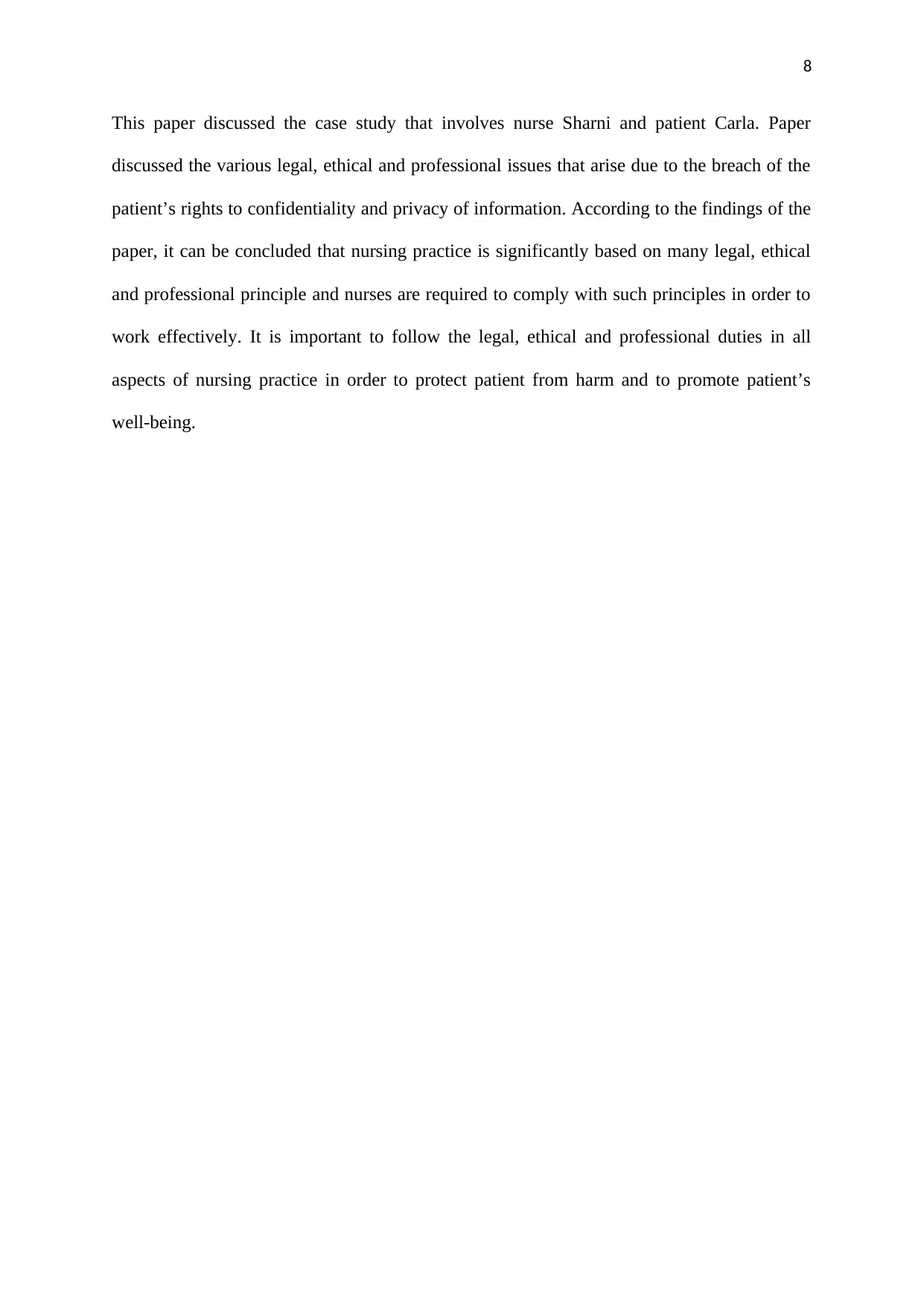
8
This paper discussed the case study that involves nurse Sharni and patient Carla. Paper
discussed the various legal, ethical and professional issues that arise due to the breach of the
patient’s rights to confidentiality and privacy of information. According to the findings of the
paper, it can be concluded that nursing practice is significantly based on many legal, ethical
and professional principle and nurses are required to comply with such principles in order to
work effectively. It is important to follow the legal, ethical and professional duties in all
aspects of nursing practice in order to protect patient from harm and to promote patient’s
well-being.
This paper discussed the case study that involves nurse Sharni and patient Carla. Paper
discussed the various legal, ethical and professional issues that arise due to the breach of the
patient’s rights to confidentiality and privacy of information. According to the findings of the
paper, it can be concluded that nursing practice is significantly based on many legal, ethical
and professional principle and nurses are required to comply with such principles in order to
work effectively. It is important to follow the legal, ethical and professional duties in all
aspects of nursing practice in order to protect patient from harm and to promote patient’s
well-being.
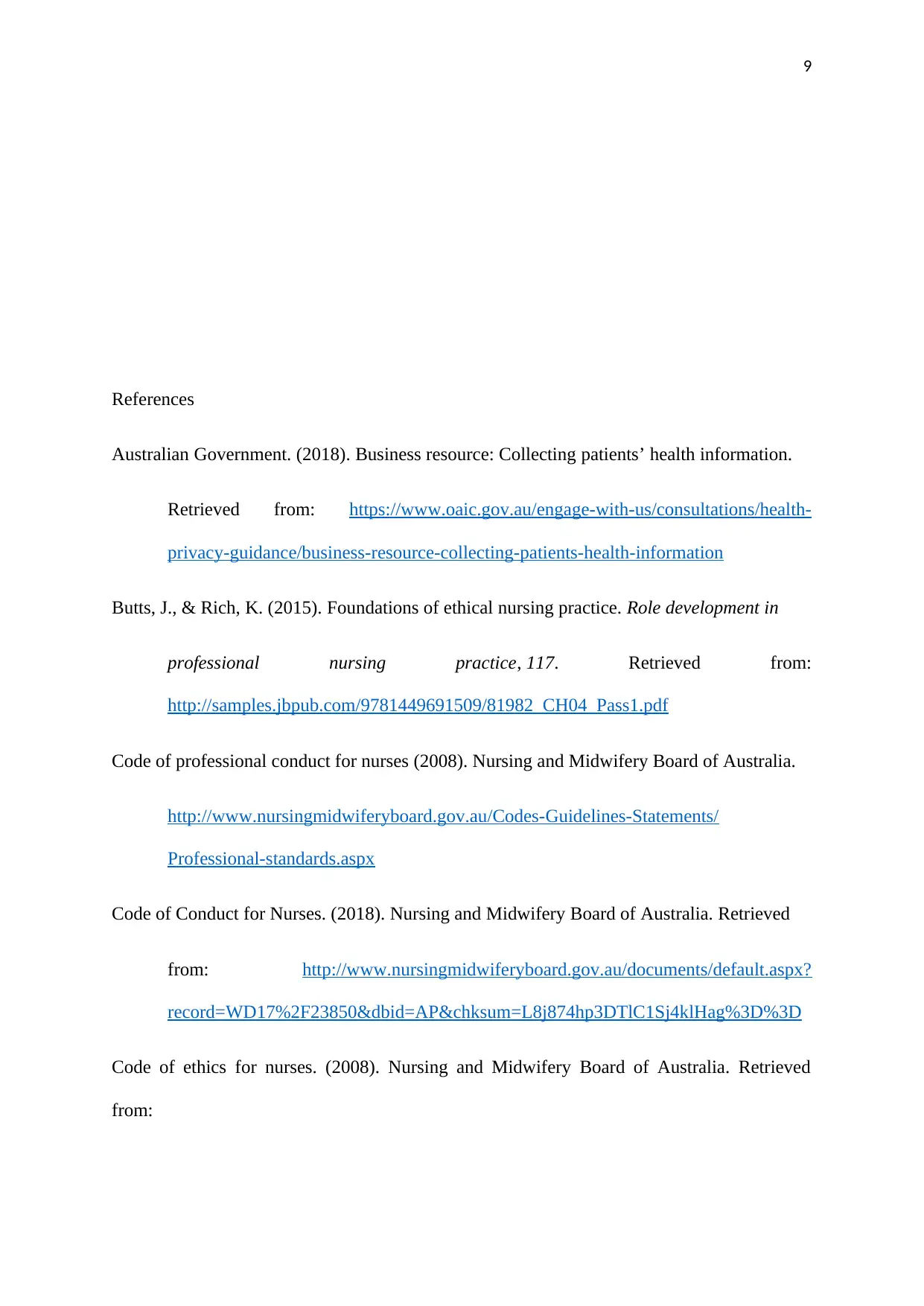
9
References
Australian Government. (2018). Business resource: Collecting patients’ health information.
Retrieved from: https://www.oaic.gov.au/engage-with-us/consultations/health-
privacy-guidance/business-resource-collecting-patients-health-information
Butts, J., & Rich, K. (2015). Foundations of ethical nursing practice. Role development in
professional nursing practice, 117. Retrieved from:
http://samples.jbpub.com/9781449691509/81982_CH04_Pass1.pdf
Code of professional conduct for nurses (2008). Nursing and Midwifery Board of Australia.
http://www.nursingmidwiferyboard.gov.au/Codes-Guidelines-Statements/
Professional-standards.aspx
Code of Conduct for Nurses. (2018). Nursing and Midwifery Board of Australia. Retrieved
from: http://www.nursingmidwiferyboard.gov.au/documents/default.aspx?
record=WD17%2F23850&dbid=AP&chksum=L8j874hp3DTlC1Sj4klHag%3D%3D
Code of ethics for nurses. (2008). Nursing and Midwifery Board of Australia. Retrieved
from:
References
Australian Government. (2018). Business resource: Collecting patients’ health information.
Retrieved from: https://www.oaic.gov.au/engage-with-us/consultations/health-
privacy-guidance/business-resource-collecting-patients-health-information
Butts, J., & Rich, K. (2015). Foundations of ethical nursing practice. Role development in
professional nursing practice, 117. Retrieved from:
http://samples.jbpub.com/9781449691509/81982_CH04_Pass1.pdf
Code of professional conduct for nurses (2008). Nursing and Midwifery Board of Australia.
http://www.nursingmidwiferyboard.gov.au/Codes-Guidelines-Statements/
Professional-standards.aspx
Code of Conduct for Nurses. (2018). Nursing and Midwifery Board of Australia. Retrieved
from: http://www.nursingmidwiferyboard.gov.au/documents/default.aspx?
record=WD17%2F23850&dbid=AP&chksum=L8j874hp3DTlC1Sj4klHag%3D%3D
Code of ethics for nurses. (2008). Nursing and Midwifery Board of Australia. Retrieved
from:
⊘ This is a preview!⊘
Do you want full access?
Subscribe today to unlock all pages.

Trusted by 1+ million students worldwide
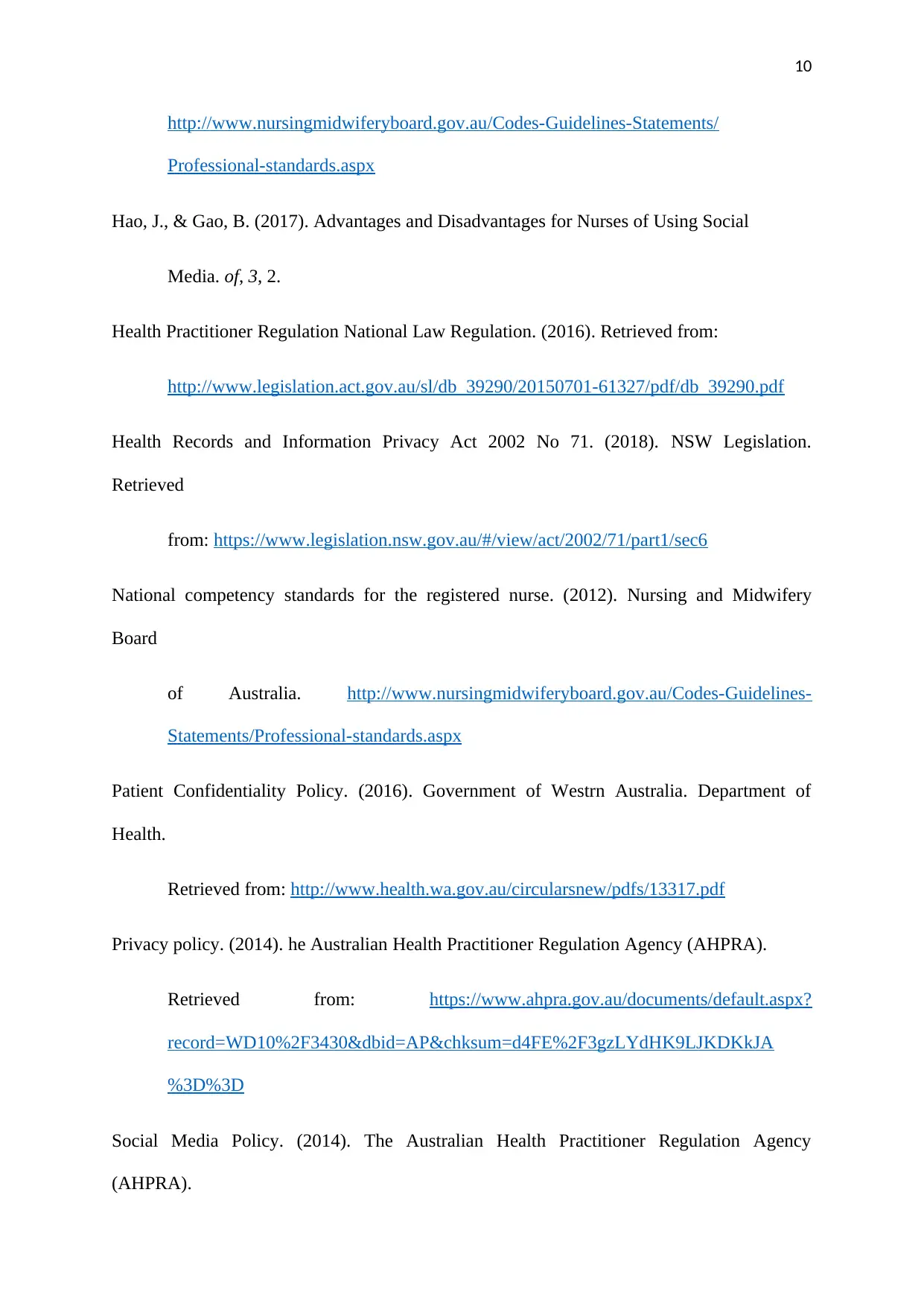
10
http://www.nursingmidwiferyboard.gov.au/Codes-Guidelines-Statements/
Professional-standards.aspx
Hao, J., & Gao, B. (2017). Advantages and Disadvantages for Nurses of Using Social
Media. of, 3, 2.
Health Practitioner Regulation National Law Regulation. (2016). Retrieved from:
http://www.legislation.act.gov.au/sl/db_39290/20150701-61327/pdf/db_39290.pdf
Health Records and Information Privacy Act 2002 No 71. (2018). NSW Legislation.
Retrieved
from: https://www.legislation.nsw.gov.au/#/view/act/2002/71/part1/sec6
National competency standards for the registered nurse. (2012). Nursing and Midwifery
Board
of Australia. http://www.nursingmidwiferyboard.gov.au/Codes-Guidelines-
Statements/Professional-standards.aspx
Patient Confidentiality Policy. (2016). Government of Westrn Australia. Department of
Health.
Retrieved from: http://www.health.wa.gov.au/circularsnew/pdfs/13317.pdf
Privacy policy. (2014). he Australian Health Practitioner Regulation Agency (AHPRA).
Retrieved from: https://www.ahpra.gov.au/documents/default.aspx?
record=WD10%2F3430&dbid=AP&chksum=d4FE%2F3gzLYdHK9LJKDKkJA
%3D%3D
Social Media Policy. (2014). The Australian Health Practitioner Regulation Agency
(AHPRA).
http://www.nursingmidwiferyboard.gov.au/Codes-Guidelines-Statements/
Professional-standards.aspx
Hao, J., & Gao, B. (2017). Advantages and Disadvantages for Nurses of Using Social
Media. of, 3, 2.
Health Practitioner Regulation National Law Regulation. (2016). Retrieved from:
http://www.legislation.act.gov.au/sl/db_39290/20150701-61327/pdf/db_39290.pdf
Health Records and Information Privacy Act 2002 No 71. (2018). NSW Legislation.
Retrieved
from: https://www.legislation.nsw.gov.au/#/view/act/2002/71/part1/sec6
National competency standards for the registered nurse. (2012). Nursing and Midwifery
Board
of Australia. http://www.nursingmidwiferyboard.gov.au/Codes-Guidelines-
Statements/Professional-standards.aspx
Patient Confidentiality Policy. (2016). Government of Westrn Australia. Department of
Health.
Retrieved from: http://www.health.wa.gov.au/circularsnew/pdfs/13317.pdf
Privacy policy. (2014). he Australian Health Practitioner Regulation Agency (AHPRA).
Retrieved from: https://www.ahpra.gov.au/documents/default.aspx?
record=WD10%2F3430&dbid=AP&chksum=d4FE%2F3gzLYdHK9LJKDKkJA
%3D%3D
Social Media Policy. (2014). The Australian Health Practitioner Regulation Agency
(AHPRA).
Paraphrase This Document
Need a fresh take? Get an instant paraphrase of this document with our AI Paraphraser
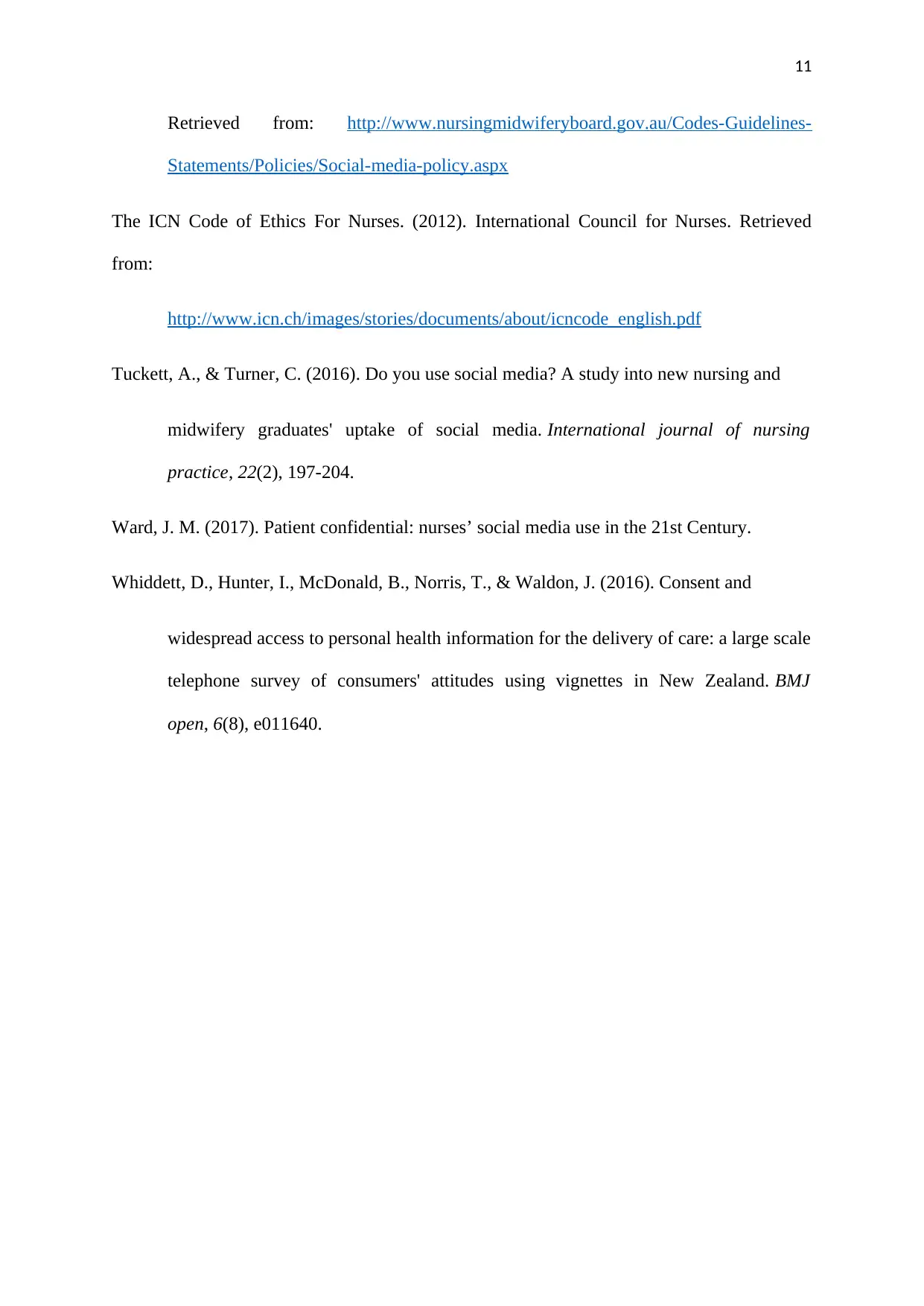
11
Retrieved from: http://www.nursingmidwiferyboard.gov.au/Codes-Guidelines-
Statements/Policies/Social-media-policy.aspx
The ICN Code of Ethics For Nurses. (2012). International Council for Nurses. Retrieved
from:
http://www.icn.ch/images/stories/documents/about/icncode_english.pdf
Tuckett, A., & Turner, C. (2016). Do you use social media? A study into new nursing and
midwifery graduates' uptake of social media. International journal of nursing
practice, 22(2), 197-204.
Ward, J. M. (2017). Patient confidential: nurses’ social media use in the 21st Century.
Whiddett, D., Hunter, I., McDonald, B., Norris, T., & Waldon, J. (2016). Consent and
widespread access to personal health information for the delivery of care: a large scale
telephone survey of consumers' attitudes using vignettes in New Zealand. BMJ
open, 6(8), e011640.
Retrieved from: http://www.nursingmidwiferyboard.gov.au/Codes-Guidelines-
Statements/Policies/Social-media-policy.aspx
The ICN Code of Ethics For Nurses. (2012). International Council for Nurses. Retrieved
from:
http://www.icn.ch/images/stories/documents/about/icncode_english.pdf
Tuckett, A., & Turner, C. (2016). Do you use social media? A study into new nursing and
midwifery graduates' uptake of social media. International journal of nursing
practice, 22(2), 197-204.
Ward, J. M. (2017). Patient confidential: nurses’ social media use in the 21st Century.
Whiddett, D., Hunter, I., McDonald, B., Norris, T., & Waldon, J. (2016). Consent and
widespread access to personal health information for the delivery of care: a large scale
telephone survey of consumers' attitudes using vignettes in New Zealand. BMJ
open, 6(8), e011640.
1 out of 11
Related Documents
Your All-in-One AI-Powered Toolkit for Academic Success.
+13062052269
info@desklib.com
Available 24*7 on WhatsApp / Email
![[object Object]](/_next/static/media/star-bottom.7253800d.svg)
Unlock your academic potential
Copyright © 2020–2025 A2Z Services. All Rights Reserved. Developed and managed by ZUCOL.





